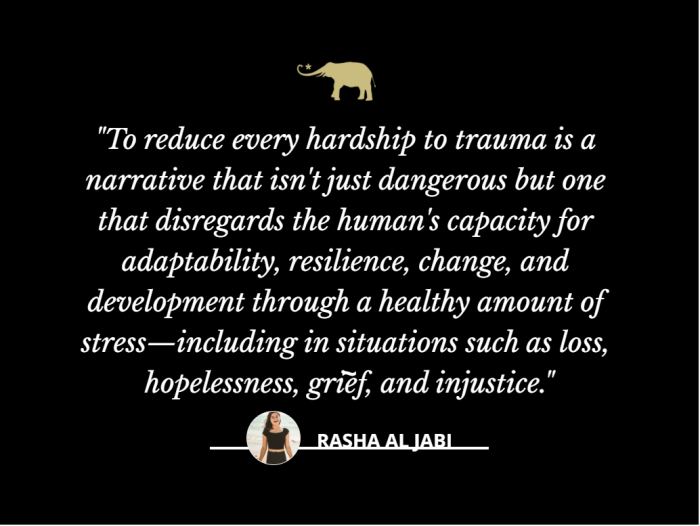View this post on Instagram
Is it just me or does the word “trauma” get tossed around like candies out of a piñata in every conversation and social media interaction we have these days?
It seems as though we are living in an age where trauma, depression—among other mental health challenges, seem to be the new cool thing to have—like an accessory or a Chanel bag or a cute puppy that is an extension or a status symbol that defines who we are.
Post-traumatic stress disorder (PTSD), complex trauma (also known as CPTSD), developmental trauma, intergenerational trauma, childhood trauma, we’ve all heard these terms used interchangeably although they vary in their definition—at least from a diagnostic and medical point of view.
According to this source, “PTSD is a psychiatric disorder that can develop after a person experiences a traumatic event. Complex PTSD, also known as CPTSD, can result if a person experiences prolonged or repeated trauma over months or years. A person with the condition may experience additional symptoms to those that define PTSD.”
Some of the underlying symptoms of both PTSD and complex PTSD may include:
>> Avoiding situations that remind a person of the trauma
>> Dizziness or nausea when remembering the trauma
>> Hyperarousal, which means being in a continual state of high alert
>> The belief that the world is a dangerous place
>> A loss of trust in the self or others
>> Difficulty sleeping or concentrating
…among many others.
But what is common among both conditions is that they do lead to dysregulation of the nervous system. The sheer memory or thought of the traumatic event, or any association with it (situations, images, smells, sounds, people, colors, textures, conversations), may somatically transport the person back in time to the original event and cause them to respond with a fight-flight-freeze-fawn reaction, mostly due to the amygdala’s taking over the brain’s functions in that specific moment of being triggered.
But in both scenarios—whether with PTSD or CPTSD, as nonmedical experts, we must respect these conditions and see them for what they actually are: a disruption of the nervous system’s capacity to regulate the body’s functions, or, in some cases such as with developmental trauma, it is a brain underdevelopment that impedes the natural process of cognitive development in early childhood and toward early adolescent and later adult years.
But in our modern culture of Instagram color-coordinated grids, 60-second TikTok skits, and saturated influencers market, it seems that not only has everyone (licensed or not) suddenly become an expert on trauma, but the word itself seems to be a guise to justify bad behaviors, resistance to change, compliance with scientific facts, laziness, selfish actions, and even narcissistic abuse.
To be clear, I am not referring to people who have been medically diagnosed by a clinical expert or have a reason to doubt that they might be experiencing the somatic symptoms of complex trauma due to their own life stories, or to those who are making financial sacrifices in therapy and private healthcare to live somewhat close to a “normal” life as they can. I am specifically talking about those whose intention is to steal the spotlight by using this new pop-cultural word to sound “cool” or gain sympathy or popularity or a few hundred new followers on their social media accounts.
According to an article titled How trauma became the word of the decade that was published on Vox.com, “The word hasn’t simply been watered down, but adopted widely as a kind of cultural touchstone. ‘I have trauma,’ just becomes like, ‘I’m depressed’ or, ‘I’m addicted to cookies,’ says Pamela Rutledge, a media psychologist. ‘It has become a popular idiom tossed around without meaning.'”
In my own quest to continue learning about the subject as a trauma-sensitive yoga and mindfulness educator, as well as someone with a personal, life-long passion for psychology, neuroscience, and Eastern philosophy, I believe there is nothing glorifying or glamorizing or deserving of an honor badge in being diagnosed with complex trauma.
In all my conversations with (medically) traumatized people whose physical health has often atrophied as a result of their debilitating mental health, not one has ever said to me, “I am so happy I have complex trauma and am on a combination of trying different medications until one works, because it makes me feel/sound cool, loved, and accepted.”
If anything, many have wished to trade their condition with someone who is healthier, had more energy to be mindful and present around their partner, child, dog/cat, loved ones, or could figure out how to nurture and love themselves better before including someone else in their life.
Many would argue that the past two years of the pandemic have led to a state of collective trauma. After all, isn’t uncertainty, fear of the unknown, loss of health, routine, job stability, or vitality—in addition to political and economic upheaval— traumatizing?
Frightening, destabilizing, distressful, dysregulating, and overwhelming—yes. But debilitatingly, medically, actually PTSD-like traumatizing? I’d argue not for everyone—but I’ll leave that for the medical experts to confirm.
If we want to dive deeper and dissect the underlying issues of complex trauma, my suggestion would be to spend some time speaking to a couple of homeless folks, and to get curious about what had happened to them—what are their unique stories and what sort of backgrounds they come from that led them to where they are today—as opposed to simply asking why they ended up in the streets, dependent on all sorts of hard drugs.
We could also visit incarceration facilities and listen to the horrifying stories of the prison population to get a glimpse of what qualifies as real, capital “T” trauma, as opposed to a couple of stressful events that are a natural part of being human and are a result of the ever-complex and unequal world we live and are learning how to adapt in.
I am not denying that actual trauma is weaved within the fabric of our society, and obviously, much of the research that is being conducted so far is determined by government funding, pharmaceutical profit, and the demographics of the participating groups in randomized control clinical trials. So naturally, a huge portion of the population that is living with and grappling with the effects of complex trauma remains undiagnosed with no access to proper medical or psychiatric care.
However, this is different from using the term interchangeably to describe any related or unrelated distressful events, such as a difficult breakup or a divorce or not getting accepted into the school or the job we had hoped and prayed for. And although some of those events may sometimes trigger one’s underlying and unresolved PTSD or manifest in trauma-like symptoms; however, they do not always lead to the prolonged effects of PTSD in the long turn.
According to the same article I had cited earlier on vox.com:
“By relying on trauma to understand our modern lives, we’re undercutting the very real impacts of stress and overwhelm. We’re flattening all hardships, conflating the horrific and life-shattering with the merely unpleasant. ‘Using the word ‘trauma’ turns every event into a catastrophe, leaving us helpless, broken, and unable to move on,’ Haslam wrote.”
It further elaborates:
“Misrepresenting trauma could also ‘stop a good portion of people from getting the right type of treatment for PTSD,’ Scheeringa says. And, he says, signal-boosting unproven or bunk research ‘harms’ our science—when people think that scientists aren’t speaking truth, they stop respecting and listening to them.”
I believe we do need a new vocabulary to describe the multi-layered and complex facets of the human experience—especially those soul-crushing moments that are difficult to compound using simple words or phrases or sentences—or for which we lack the awareness to describe to begin with.
But to reduce every hardship to trauma is a narrative that isn’t just dangerous but one that disregards the human’s capacity for adaptability, resilience, change, and development through a healthy amount of stress—including in situations such as loss, hopelessness, grief, and injustice.
And what about the role of neuroplasticity—a term that refers to the brain’s ability to change and adapt as a result of experiences?
While in the past, researchers used to believe that neurogenesis, or the creation of new neurons, stopped shortly after birth, today, research shows that our brains possess an enormous capacity to reorganize pathways, create new connections, and, in some cases, even create new neurons.
The neuropsychologist, Donald Hebb, reinforced this idea of how plastic our brains are in his famous phrase, “Neurons that fire together, wire together.”
I suspect that his phrase might even extend to creating new neural pathways through undergoing stressful situations in life—that the more we build healthy habits that teach our brains and nervous system how to regulate under stressful stimuli, like mindfulness practices, healthy eating habits, regular sleep and exercise, and spending a few hours in nature, the more adaptable and resilient we become to situations that require creative problem-solving and adaptability.
Instead of labeling every stressful event, including unprecedented ones like the pandemic or political tension as traumatic, let us learn how to shift our perspective, widen our vocabulary, and use intricate language to redefine our experiences as they are instead of limiting ourselves to two initial reactions: defensiveness or victimhood.
Not everything qualifies as capital “T”, medical trauma, and there have been people throughout history who have experienced situations that should have qualified for a PTSD diagnosis; however, they did not due to a magnitude of other reasons, including having a supportive community, early intervention, and the brain’s remarkable capacity for neuroplasticity.
I do believe that the lack of mental health education in our school system and society and the accessibility of entertainment and social media have contributed to this misinformation and our ability—or lack thereof—to describe complex emotions and everyday life challenges.
Evidently, we need a reeducation in emotional vocabulary that would help us understand, label, and regulate our emotions as they arise without feeling the need to diagnose ourselves based on a few Instagram posts or the opinions of a social media celebrity who has no solid foundation to their perspective.
But more importantly, we need to put more faith in our ability—individually and collectively—to overcome adversity without believing that every difficult situation will leave a permanent scar or deplete our ability to grow, learn, love, or live in line with our principles, values, and aspirations.
Let us not forget that many medically diagnosed people have no choice but to exist within the confines of their debilitating health, which can be limiting, isolating, and frustrating.
But for those of us who do have a choice to redefine our experiences through exploring new narratives, I do believe we are obligated and responsible to make better choices.
Perhaps, if we learn to zoom out of our own automatic narratives of either defensiveness or victimhood for a little while, we might come to realize that we’re not as fragile as we thought we were.
And maybe, this is where the opportunity for real healing begins.
This article was inspired by a piece that was originally published on vox.com. Click here to read the full article.
References:
https://www.vox.com/the-highlight/22876522/trauma-covid-word-origin-mental-health
https://www.medicalnewstoday.com/articles/322886#triggers
https://www.ncbi.nlm.nih.gov/pmc/articles/PMC3968319/
https://www.verywellmind.com/what-is-brain-plasticity-2794886
https://www.mhs-dbt.com/blog/parasympathetic-nervous-system-and-trauma/








Read 11 comments and reply